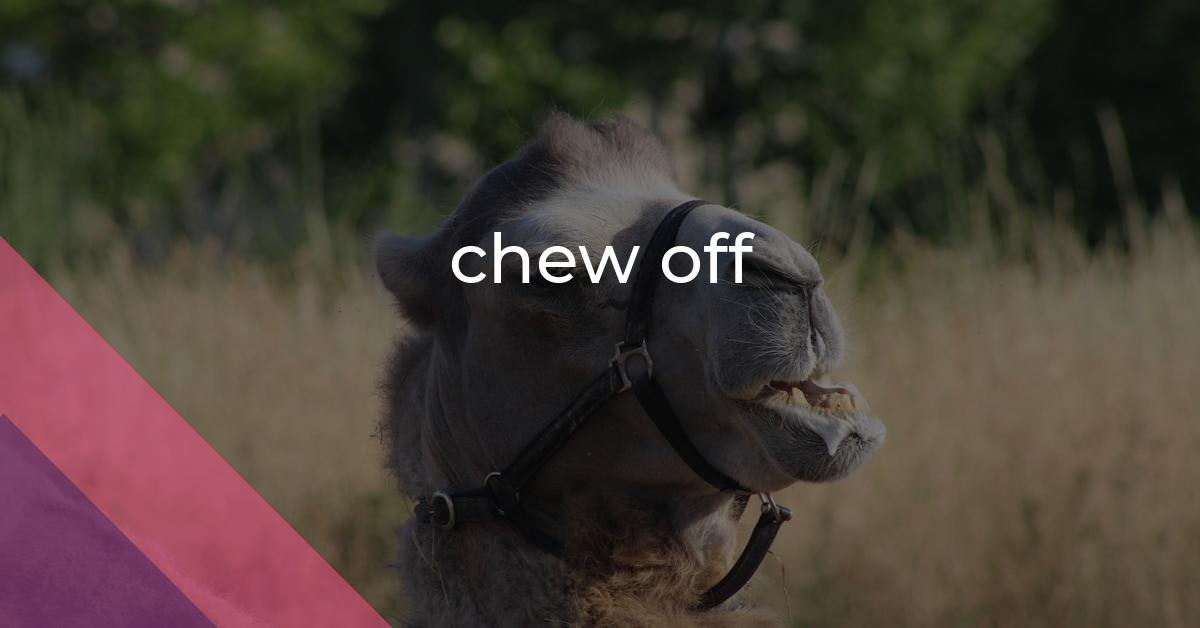chew off: Idiom Meaning and Origin
What does ‘chew off’ mean?
The idiom "chew off" means to bite or tear a piece of something using the teeth. It can also be used metaphorically to describe the act of freeing oneself from a difficult or challenging situation. Additionally, it can refer to incessantly talking or complaining about a topic.

Idiom Explorer
The idiom "have a bite" means to eat a small amount of food, often as a snack or to taste something. It implies taking a quick break to satisfy hunger or try a small portion of something.
The idiom "eat one's head off" means to consume something excessively or without restraint, often referring to a person or an animal consuming food in large quantities. It emphasizes the idea of extreme or voracious eating.
The idiom "cut to pieces" means to criticize or attack someone or something severely and mercilessly.
The idiom "chomp at the bit" means to be eagerly impatient or restless to do something. It is derived from the behavior of horses when they bite down on the bit in their mouth due to excitement or impatience.
The idiom "choke off" means to stop or prevent something from continuing or progressing.
The idiom "chew up" means to damage or destroy something, typically by biting or grinding it with the teeth. It can also be used figuratively to describe the act of criticizing or tearing apart someone's ideas or arguments, often in a harsh or thorough manner.
The idiom *chew the scenery* means to overact or to be excessively dramatic, often in a way that is seen as unrealistic or attention-seeking.
The idiom "chew the meat and spit out the bones" means to extract the useful or valuable parts of something while discarding the rest. It suggests the act of separating the good from the bad or the important from the unimportant.
The idiom "chew on" means to think about or consider something carefully. It implies taking time to contemplate or analyze a situation, idea, or problem before coming to a conclusion or making a decision. The phrase often suggests a thorough and thoughtful examination of a matter.
Mystifying Oral Habits
Chew off is an idiom commonly used in conversations in the United States. It is a figurative expression that refers to the act of escaping or extricating oneself from a difficult or unpleasant situation. This idiom can be traced back to the behavior of animals, specifically rodents, that chew off their own limbs to free themselves from traps or other dangerous situations.
When we use the idiom "bite off," we mean to take on more than we can handle or to undertake a task or responsibility that is too difficult or overwhelming. This expression is often used to caution against overcommitting oneself or taking on tasks that are beyond one's abilities. It can be related to the idiom "chew off," as both convey the idea of attempting something challenging and potentially having to take drastic measures to overcome it.
Another related idiom is "chew up," which means to destroy or break something into smaller pieces by biting or grinding it with the teeth. This expression can be used metaphorically to describe situations where something or someone is overwhelmed or defeated. It can be associated with the idiom "chew off" in the sense that both involve the idea of breaking free or overcoming a difficult situation through forceful or determined action.
When someone "bites off more than they can chew," it means that they have taken on a task or responsibility that is too difficult or demanding for them. This idiom can be connected to the idiom "chew off" as both involve the idea of facing a challenging situation and having to find a way to escape or resolve it. In this case, someone who has bitten off more than they can chew might need to take extreme measures or make sacrifices to overcome the difficulties they are facing.
Finally, the idiom "chew on" means to think about something carefully or to consider or ponder a particular topic or issue. It can be related to the idiom "chew off" in the sense that both involve a process of reflection or contemplation. However, while "chew on" focuses on the act of thinking or reflecting, "chew off" emphasizes the action of taking necessary steps to escape or overcome a difficult situation.
Overall, the idiom "chew off" is commonly used in informal speech in the United States to describe the act of escaping or extricating oneself from a difficult or unpleasant situation. It can be related to idioms such as "bite off," "chew up," "bite off more than one can chew," and "chew on," which all involve the idea of facing challenges, taking determined action, or reflecting on a particular issue. These idioms highlight the importance of determination, effort, and considering alternatives in overcoming obstacles and difficulties in various contexts of life.
Example usage
Examples of how the idiom *chew off* can be used in a sentence:
- He had to chew off the pieces of meat that got stuck in his teeth after eating the steak.
- The dog tried to chew off its leash in order to escape.
- She realized she needed to chew off the habit of biting her nails.
More "Verb" idioms



